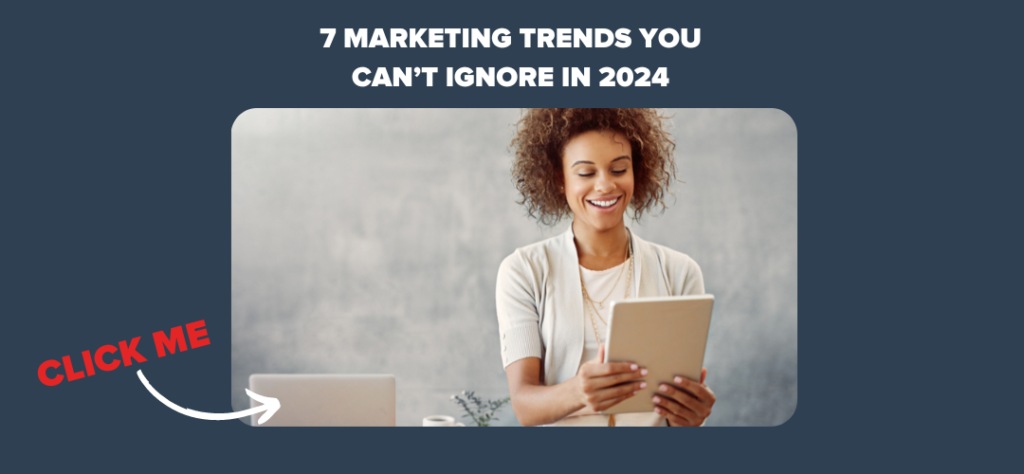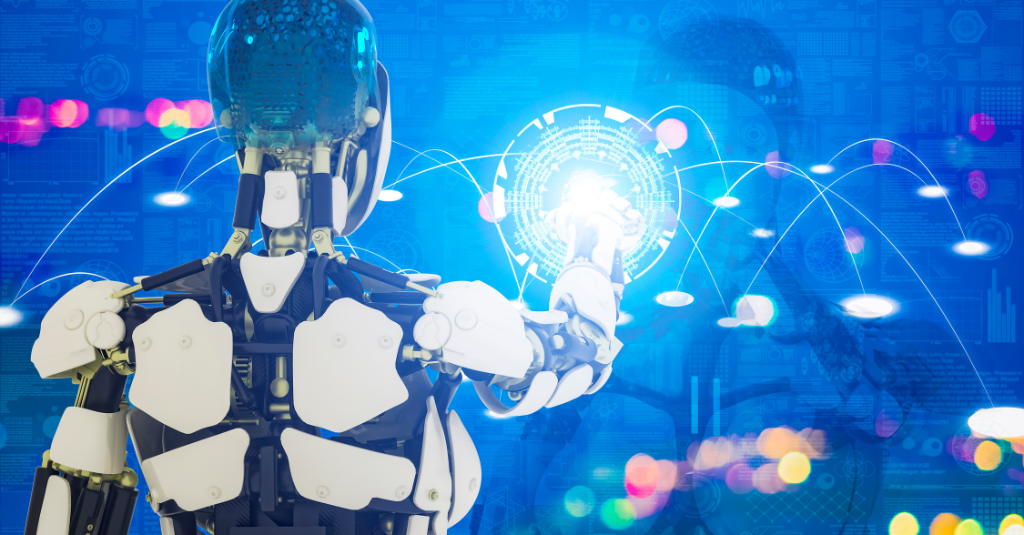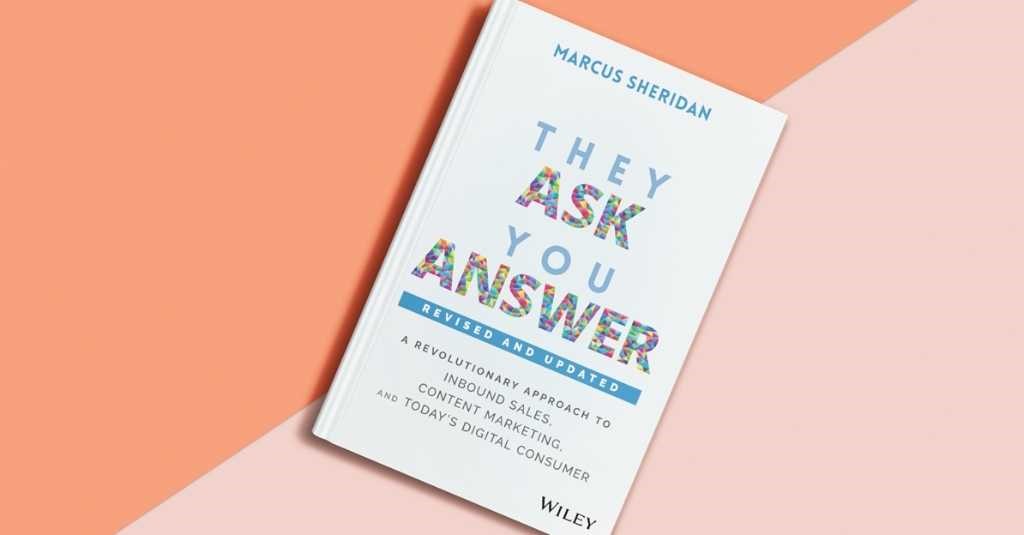Marketing today can feel overwhelming, especially with so many tools and trends constantly evolving. If you’re like most marketers, you’ve probably heard that artificial intelligence (AI) is the future of marketing. But maybe you’re not sure where to start or whether AI is even right for your business. Does it require coding skills? Is it too expensive? Will it make your marketing feel impersonal?
Here’s the good news: AI is more accessible than ever.
You don’t need to be a tech wizard or have a massive budget to leverage AI in your marketing strategy. In fact, AI can help simplify your workload, allowing you to focus on what really matters—connecting with your audience and driving results.
In this article, you’ll learn practical ways to start using AI in your marketing today.
What is AI & How Does It Apply to Marketing?
At its core, artificial intelligence (AI) is the ability of machines to mimic human intelligence. It uses algorithms and data to solve problems, make decisions, and even learn over time.
In marketing, AI can help automate processes, analyse large amounts of data, and personalise customer experiences—things that would take humans a lot more time and effort to do manually.
But how does AI specifically apply to marketing?
Think of it as a tool that helps you work smarter, not harder. Instead of spending hours manually segmenting audiences or figuring out which type of content performs best, AI can do this for you in seconds.
But it doesn’t just save time; it gives you deeper insights that you might not spot on your own. For example, AI can:
- Analyse customer behaviour: AI can sift through massive amounts of data to predict future customer actions, helping you tailor marketing campaigns more effectively
- Automate routine tasks: From sending emails at the right time to managing social media interactions, AI tools can handle repetitive tasks, freeing up your time
- Deliver personalised experiences: AI allows you to create highly personalised marketing, showing each customer the right message or product at the right time, boosting engagement and conversion rates
- Create content at scale: At RedPandas, we use AI to create content at scale, and after coaching dozens of businesses to do the same, we know that AI that creates content is extremely powerful
AI in marketing isn’t about replacing humans.
It’s about enhancing what you do, making your efforts more efficient and effective.
Whether it’s automating routine tasks or crunching data, AI lets you focus on the creative, human side of marketing that drives real connections with your audience.
Key Areas Where AI Can Improve Marketing
AI has the potential to transform many aspects of marketing, from strategy development to campaign execution. Here are the key areas where AI can significantly improve your marketing efforts:
1. Customer Segmentation
AI can analyse vast amounts of customer data—demographics, behaviour, purchasing history, and more—to automatically group your audience into highly specific segments. This means you can create more personalised and targeted marketing campaigns, delivering the right message to the right people at the right time. AI-powered tools can identify patterns in your customer base that would be impossible for humans to detect manually, allowing you to market more effectively.
2. Content Creation and Curation
While AI can’t fully replace the creativity of a human, it can certainly assist in creating and curating content. For example, AI-driven tools can generate product descriptions, social media captions, blog posts, video scripts, email newsletters, and more.
AI can also help curate content by recommending articles, videos, or products based on a customer’s past behaviour or interests, ensuring that your audience always sees relevant content.
3. Email Marketing Automation
AI can optimise your email marketing by personalising email content and timing. It can predict when a recipient is most likely to open an email and which subject lines or offers will resonate best.
AI-driven platforms can automate the entire process, from audience segmentation to email deployment, ensuring each customer receives personalised and timely messages, which boosts open rates and engagement.
4. Predictive Analytics
AI can predict future trends and behaviours based on past data, helping marketers make smarter, data-driven decisions.
For example, predictive analytics can forecast which products customers are likely to buy or which marketing strategies will be most effective. This helps you allocate your budget more efficiently and focus on campaigns that are likely to yield the highest return on investment (ROI).
5. Chatbots and Customer Support
AI-powered chatbots are revolutionising customer service. These chatbots can provide real-time support, answering customer queries, providing recommendations, and even handling transactions.
They can work around the clock, ensuring that your customers are always attended to.
Chatbots can also collect valuable data on customer interactions, helping you further personalise your marketing efforts.
6. Social Media Management
Managing social media accounts can be time-consuming, but AI tools can help by automating tasks such as posting content, monitoring engagement, and even analysing performance.
Some AI tools can suggest the best times to post, the types of content that perform well, and even recommend replies to customer comments, helping you stay on top of your social media game without the constant manual effort.
Top AI Tools for Marketers
So, you know that AI is important and that there are many use cases, but which ones should you start off with? Here are some of the top AI tools that you can start using today:
1. HubSpot (AI-Powered CRM and Marketing Platform)
HubSpot is a comprehensive marketing platform with AI features built into its CRM, email marketing, and content tools.

Here are some of the things that HubSpot AI can do:
- Content generation: Create blog posts, emails, social media posts, and more using AI-powered writing tools
- Personalisation: Tailor content and communication based on customer data and behaviour
- SEO optimisation: Suggest keywords, optimise on-page SEO, and improve content rankings
- Predictive lead scoring: Automatically prioritise leads based on AI predictions of conversion likelihood
- Sales forecasting: Generate more accurate sales forecasts based on historical data and trends
- Chatbots and automation: Automate customer interactions with AI-powered chatbots and workflows
- CRM data analysis: Provide insights by analysing CRM data to spot trends, opportunities, and patterns
- Email campaign optimisation: Suggest best times to send, improve subject lines, and increase engagement
- Customer service automation: Help teams respond faster by suggesting answers to common queries or routing tickets
- Behavioural tracking: Analyse user behaviour on websites to improve the customer journey
- A/B testing: Automate A/B testing for landing pages and emails to find the most effective versions
- Smart recommendations: Provide content and product recommendations based on customer data
- Performance analytics: Offer insights into campaign performance and customer interactions
- Marketing automation: Automate personalised outreach through email, social, and web channels
- Social media scheduling: Automatically schedule and optimise social media posts for better reach
2. MarketMuse (Content Strategy and SEO)
For content marketers, MarketMuse uses AI to help with content planning and SEO optimisation.

Here are some of the things MarketMuse can do:
- Content research: Identify gaps in content and suggest topics to cover based on relevance and search demand
- Content optimisation: Provide recommendations for improving existing content for better rankings and engagement
- Topic modelling: Generate topic clusters and related subtopics to build more comprehensive content strategies
- SEO keyword suggestions: Suggest relevant keywords to include in content for improved search engine rankings
- Competitive analysis: Analyse competitor content to find weaknesses and opportunities for differentiation
- Content briefs: Generate detailed content outlines with targeted keywords, questions to answer, and structure suggestions
- Content scoring: Assign scores to content based on its quality, comprehensiveness, and optimisation for target topics
- Content planning: Help plan content strategies by prioritising topics that will have the greatest impact on search performance
- Internal linking recommendations: Suggest internal links to boost SEO and improve user experience
- Content inventory: Audit and organise existing content to identify areas for improvement or consolidation
- AI-powered writing assistant: Assist with content creation by generating text suggestions and topic ideas
- SERP analysis: Evaluate search engine results pages to understand what top-ranking content includes
- Performance tracking: Monitor the performance of published content and track improvements in rankings and traffic over time
- Content forecasting: Predict the potential success of new content based on historical data and market trends
3. ChatGPT (Conversational AI and Content Creation)
ChatGPT, an AI tool from OpenAI, can help marketers generate ideas, write content, and even interact with customers through chatbots.

Here are just a few use cases of ChatGPT:
- Text generation and summarisation: Write, rewrite, and summarise text including emails, meeting notes, blog posts, and reports
- Brainstorming and idea exploration: Help generate ideas for projects, content, or creative tasks such as stories and strategies
- Code generation and debugging: Write and debug code in various programming languages, automate repetitive tasks, and explain technical concepts like algorithms
- Learning and tutoring: Provide explanations for complex subjects, tutor in areas like programming, mathematics, or history, and offer simplified versions of difficult concepts
- Language translation: Translate text between multiple languages and assist with grammar and language structure
- Data analysis: Perform advanced data analysis, create data visualisations, and help with tasks like summarising or manipulating data (e.g., in Excel)
- Web browsing (Plus and Enterprise users): Search the web to retrieve current and specialised information
- Image processing: Interpret and provide context for images, answer questions about them, or generate images using DALL-E
- Voice interaction: Engage in conversations via voice, and respond using voice (in mobile and some web versions)
- Custom GPTs: You can create custom GPT bots that allow you to achieve whatever you want. You can modify the behaviour of the bot to respond, act and generate content exactly as you desire
- GPT Functions: ChatGPT Functions allow you to connect your Custom GPT with any other software. You can pretty much achieve anything you want by using ChatGPT Functions, although it does require development knowledge. You can learn about how to build ChatGPT Functions here
4. DupDub AI
DupDub AI has many pre-built features that allows you to supercharge your social media efforts.

Here are some of the things it allows you to do:
- AI-powered dubbing: Automates dubbing for videos in over 40 languages, providing human-like voiceovers that sync with the original content
- Voice cloning: Replicates voices to maintain consistency across different languages or for specific character dubbing
- Context-aware translations: Ensures the translation matches the tone and context of the original audio, creating more natural-sounding results
- Subtitles and captions: Automatically generates subtitles, captions, and SRT files in both original and dubbed languages
- Quick turnaround: Streamlines the dubbing process, reducing time and costs compared to traditional methods
- Multilingual support: Dubs content for webinars, e-learning, advertisements, movies, and other videos into various languages
- Remote collaboration: Teams can work together in real-time on projects, regardless of location
- High security: Provides strong security protocols, including NDAs, to protect content and data
- Voice customisation: Offers options to customise voice tones and emotional delivery for different content
- Video to text: Allows you to convert video to text in minutes, so that you can repurpose videos into blog posts quickly and efficiently
- Create AI Generated Videos: You can create videos with a voiceover using it’s pre-built AI avatars if you have a script. Or if you don’t have a script, you can ask the software to develop one for you and then edit as required
- Edit Videos: You can edit videos directly within DupDub
- Connect with other software: DupDub AI connects with Canva and ChatGPT to allow for a greater number of features that aren’t possible within the software itself
DupDub AI is great for anyone looking for an all-in-one social media and content AI tool.
5. Adzooma (AI for Paid Ads)
Adzooma AI simplifies paid advertising by using AI to automate and optimise campaigns across platforms like Google Ads, Facebook Ads, and Microsoft Ads.

Here are some of its features:
- Campaign Management: Manage Google, Facebook, and Microsoft ad campaigns from a single platform. This includes viewing detailed breakdowns, adjusting budgets, and activating or deactivating campaigns with ease.
- AI-driven Optimization: Adzooma’s AI and machine learning analyze campaign performance and provide actionable recommendations to improve ROI, reduce wasted spend, and optimise ad performance.
- Automation: Create custom automation rules to manage repetitive tasks like pausing underperforming ads or adjusting bids, helping to save time and improve efficiency.
- Opportunities Engine: Continuously scans campaigns for opportunities to boost performance, offering suggestions to apply with just one click.
- Custom Reporting: Generate and download customizable reports to track performance metrics, set up white-label reports, and easily share with clients or colleagues.
- Multi-account Support: Manage multiple ad accounts across different platforms from a single interface, ideal for businesses or agencies managing several campaigns.
- Real-time Notifications: Get alerts via email, SMS, or in-app when campaigns require attention, helping to maintain control over budgets and performance
Read: Why Content Marketers Must Embrace AI (+The Best Content Marketing AI Tools)
Read: How AI is Revolutionising SEO (+ 4 AI SEO Tools to Use)
How AI Can Save Time and Improve Results
One of the most compelling reasons to use AI in marketing is the time it saves. Marketing often involves repetitive tasks—sending emails, analysing data, responding to customer queries—and these can eat up valuable hours that could be better spent on strategy and creativity.
AI takes care of these time-consuming tasks for you, allowing you to focus on higher-level decisions that drive growth.
Here’s how AI helps save time and deliver better marketing results:
1. Automating Repetitive Tasks
AI can automate tasks like email marketing, social media posting, and even customer segmentation.
For instance, rather than manually sending follow-up emails to different customer groups, AI tools like HubSpot can automate the process by sending personalised emails at the right time.
This not only saves you hours but also increases engagement by ensuring that each message is relevant and timely.
2. Real-Time Data Analysis
Manually gathering and analysing data can be incredibly time-consuming, and even then, human analysis may miss patterns that AI would catch.
AI tools can instantly process massive amounts of data, providing real-time insights into customer behaviour, campaign performance, and emerging trends.
This means you can quickly adjust your strategies based on data rather than relying on guesswork or delayed reports.
3. Improved Personalisation
AI’s ability to analyse data allows for hyper-personalisation in marketing campaigns.
For example, AI can track a customer’s browsing history, past purchases, and preferences, then automatically serve personalised content or product recommendations.
This ultimately results in increased conversion rates, better customer satisfaction, and a more tailored experience—all without the need for manual effort.
4. Optimising Paid Advertising
AI can optimise your paid advertising campaigns in ways that would be difficult for a human to manage manually.
Tools like Adzooma use machine learning to automatically adjust bids, target audiences, and optimise ad placements based on real-time performance data.
This may lead to higher click-through rates and lower costs, as your ads are constantly fine-tuned to perform better without the need for constant monitoring.
5. Enhancing Customer Support with AI Chatbots
AI chatbots can handle common customer queries 24/7, freeing up your team to focus on more complex issues.
These bots can quickly answer questions, offer product recommendations, or resolve issues without the need for human intervention.
This not only saves time for your support team but also improves customer satisfaction by providing immediate assistance.
6. Reducing Human Error
AI tools can help reduce the risk of human error, especially in data-heavy tasks.
For example, manually inputting data or segmenting customer lists can lead to mistakes that affect your marketing campaigns. AI, however, can handle these tasks with precision, ensuring that your campaigns are accurate and targeted, which ultimately leads to better results.
While automating repetitive tasks can be a gamechanger, there are also risks when it comes to using AI, which is why your company should focus on developing an AI Policy to mitigate these risks.
Read: What is an AI Policy & How Can You Develop One for Your Company?

Common Concerns and Misconceptions About AI In Marketing
While AI is gaining popularity in marketing, many marketers and business owners still have concerns or misconceptions that hold them back from adopting it.
1. “AI is too expensive for my business”
One of the biggest misconceptions is that AI is only for large companies with massive budgets.
While it’s true that advanced AI solutions can be costly, there are plenty of affordable, even free, AI tools available.
Platforms like Grammarly, ChatGPT or HubSpot offer free versions with powerful AI capabilities that small businesses can start using right away. Plus, the time and cost savings that come from automating tasks often make AI a smart investment even for businesses with tight budgets.
2. “I’m not tech-savvy enough to use AI”
Many assume that using AI requires advanced technical skills or coding knowledge. This couldn’t be further from the truth.
Today’s AI tools are designed to be user-friendly, even for those with no technical background.
While there are proven formulas to prompt better and get the results you want, using AI isn’t something that only experts can access.
3. “AI will make my marketing feel impersonal”
It’s easy to think that automation and AI could strip the human element out of your marketing, making it feel robotic or generic. And it definitely can.
However, if you use the right promps and the right strategy, there are ways to make your content sound human.
Read: How to humanise your content with AI

4. “AI will replace human marketers”
This is a common fear, but AI is not here to replace marketers—it’s here to assist them. Think of AI as a tool that helps you work smarter, not as a replacement for human creativity and strategy.
AI can handle tasks like data analysis, automating emails, or predicting customer behaviour, but it’s marketers who set the goals, create the campaigns, and build the relationships. AI enhances your efforts, making them more efficient, but it still requires human oversight and creativity.
5. “AI is not accurate or reliable”
Another concern is that AI might make mistakes or provide unreliable data. While no tool is perfect, AI systems improve over time as they learn from more data. In fact, many AI tools are designed to reduce human error, especially in data analysis and reporting.
The key is to use AI as a complement to human judgment, double-checking its recommendations rather than trusting it as a bible.
6. “AI is too complex to integrate into my current marketing.”
Some marketers fear that integrating AI into their existing systems will be a daunting and time-consuming process. However, many AI tools are designed to easily integrate with the platforms you’re already using.
Whether it’s email marketing, social media management, or customer relationship management (CRM), most AI tools offer plugins or API integrations that allow you to seamlessly incorporate them into your existing workflows without needing a complete overhaul.
Start Now!
AI is no longer a futuristic concept reserved for big tech companies—it’s a powerful tool that marketers of all sizes can use today to save time, improve personalisation, and make smarter, data-driven decisions. By automating repetitive tasks and providing deeper insights into customer behaviour, AI allows you to focus on the creative and strategic parts of marketing that drive real business results.
If you haven’t started using AI, you need to start now.
Your competitors are using AI. If you don’t get on top of it, you’ll be left behind.
Go back through this guide and pick just one of the tools I mentioned. Sign up and start using it. As you work through it and use the tool more, you’ll find better and quicker ways of doing things.
Read: 7 Marketing Trends You Can’t Ignore in 2024















